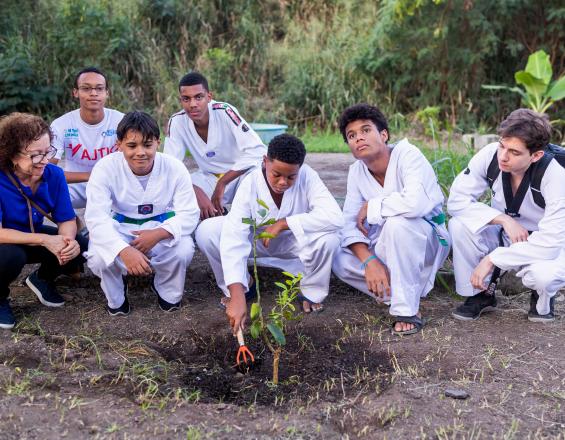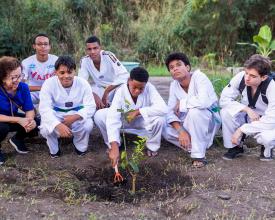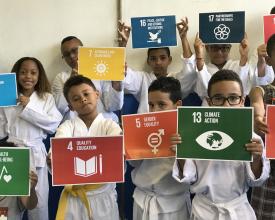

In Rio de Janeiro’s favelas, where children and youth are particularly vulnerable to the heightened impacts of climate change, limited green spaces and inadequate infrastructure compound the challenges they face. Our project specifically targets these communities, utilizing taekwondo, a Korean martial art, as a means to instill environmental consciousness and empower our beneficiaries to become agents of positive change.
Belt promotion tests, a key aspect of our initiative, are traditional assessments in taekwondo. However, our methodology goes beyond tradition. In these tests, we uniquely integrate environmental challenges, moving beyond the evaluation of physical abilities to create a profound connection between the sport and environmental responsibility. AJTKD consistently takes students to restore areas in Rio, focusing on Madureira and Sulacap. Through tree planting and ecosystem restoration, we empower youth not only to excel in taekwondo but also to actively contribute to a more sustainable city.
Context
Challenges addressed
Location
Impacts
As part of their belt tests—a dynamic process to evaluate martial arts skills—our students actively engage in progressively challenging environmental activities, a distinctive aspect of our methodology. These activities include tree planting, recycling, community clean-ups, and educational workshops. As students graduate and reach the black belt level, they not only master the methodology but also become disseminators of it, emerging as leaders in their communities. This transition empowers them to initiate impactful actions, such as organizing community workshops, leading clean-up campaigns, and championing sustainable practices. These graduates become mentors, leading by example and inspiring other youth to actively engage as advocates for the environment. They focus on addressing the unique challenges faced by favelas and actively contribute to restoring areas in the suburbs.
Our students have planted 127 trees to date, a landmark that goes beyond a commitment to environmental sustainability. It contributes to the restoration of the Atlantic Forest and enriches local ecosystems, fostering biodiversity and providing a renewable source of nourishment for the community. Our holistic community development approach has directly impacted 7,800 youth and families through assistance and education. Our efforts have earned us the BBC Green Sport Award, reaffirming our commitment to sustainability in sports.






